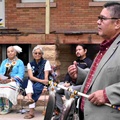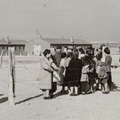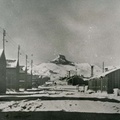By now, I’m sure most of you are aware that Don Wakamatsu has been named the manager of the Seattle Mariners, making him the first Asian American to hold such a position in major league baseball and the first Japanese American to hold a head coaching position in any of the major professional sports. Just a few months prior, Erik Spoelstra (who is Filipino American) was named head coach of the NBA's Miami Heat, making him the first Asian American to hold a head coaching position in any of the major professional sports.
I am happy for Wakamatsu, whom I had the pleasure of interviewing a few years back. At the time, he was living in Arizona, where he was managing a minor league team. He was extremely accommodating and both knowledgeable about his Japanese American heritage and proud of it. I also saw him play for the White Sox during his brief big league career. At time, there were only a handful of Japanese American/Asian American/Asian players who had ever played big league ball, so his making the majors was a very big deal within the community. Otherwise, his playing career did not garner a lot of attention. He loaned a glove and baseball bat from his playing career for the More Than a Game exhibition at the Japanese American National Museum. His name was inscribed on the bat. It was misspelled.
I suspect this isn’t going to be a problem anymore. As the manager of a major league baseball team, he joins a fraternity consisting of just thirty members in an age when sports are covered with obsessive detail by a media that never sleeps. His every move will be chronicled. As is often the case, much of that scrutiny will come from within the ethnic community, since, fairly or not, we will likely hold him to a higher standard since he represents us to the baseball world. Whether true or not, we assume that his success—or lack of it—will have an impact on when we see the second Japanese American/Asian American manager.
But while this is a big deal, it is not quite as big a deal as it might have been a few years back. It was little more than a decade ago that Hideo Nomo debuted for the Dodgers. Now that was a big deal! The reason for this was clear: there were almost no Japanese American/Asian American/Asian players back then and none was close to being a star. So when a guy like Nomo emerged, he was feeding a long-standing hunger among Asian Americans even if we knew that he was not really one of “us.” I was in Los Angeles at the time, and it seemed like half of the L.A. Asian American community could be found in the stands every time he pitched. His exploits were breathlessly detailed in the vernacular press.
But then came Ichiro. And Irabu. Then Wang, Kim, Park, Saito, Matsui, and too many others to mention. Now, when I see an Asian face in a major league baseball game, it barely even registers. Indeed, Wakamatsu, a former catcher, is going from one team that has a Japanese American starting catcher (Kurt Suzuki of the A’s) to another with a Japanese starting catcher (Kenji Johjima of the Mariners). And no one thinks this is unusual! So while Wakamatsu’s hiring is certainly significant, the fact that it doesn't seem more significant says a lot about how much has changed in the last ten to fifteen years.
You know the crazy thing about his hiring? Some media reports indicate that he was hired in part because he was Japanese American, since two of the Mariners’ highest profile players are Japanese, Ichiro and Johjima. If so, being a major league manager in the 2000s can join the short list of occupations where it was actually an advantage to be Japanese American, joining gardening (1940s to 1970s), chick sexing (1940s and 1950s), and professional wrestling (1950s and 1960s).
So I hope Wakamatsu does well in his new job. He has his work cut out for him: the Mariners lost 101 games last year and have been under .500 for four out of the last five years. I hope he is able to turn around Johjima’s career after a rough 2008. I hope he can rejuvenate an offense that scored the second fewest runs in the league.
But most of all, I hope they spell his name right.
© 2008 Brian Niiya





